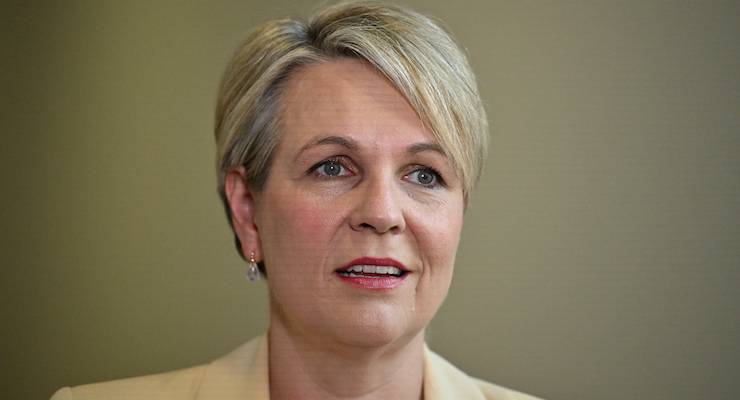
“Scientists are very aware of ecological grief,” said Terry Hughes, one of Australia’s leading coral scientists, in early 2016.
Their fluency in this anthropogenic phenomenon, he went on to explain, owed to their role in chronicling the profound demise of the world’s species and their ecosystems.
At the time, Hughes’ remarks were made against the backdrop of devastation visited on the Great Barrier Reef by a mass bleaching event — the third in the space of two decades.
He said that after he showed the results of the aerial surveys to his students, “we wept”.
In the six years since, global heating has given rise to three further mass bleaching events, with the latest in 2022 being the first to occur during the Pacific Ocean’s cooler La Niña phase.
In the result, scientists fear the reef has now been reduced to little more than a “graveyard” — an enduring monument to both human excess and failure.
Despite this, however, Environment Minister Tanya Plibersek has as recently as the weekend rejected renewed pressure from UNESCO to list the reef as endangered.
“I don’t want to see Australia singled out,” she said in an echo of the former Morrison government.
“I’ll be advocating for Australia’s best interests in any international discussions, and it’s in Australia’s best interests that the Great Barrier Reef is not listed as endangered.”
An endangered listing could limit certain development activities within the vicinity of the reef that lack the prior approval of the World Heritage Committee, which some say could impact tourism and trade.
Speaking to Crikey, Glenn Walker of Greenpeace Australia Pacific said Plibersek’s stance was emblematic of the government’s wider disinclination to recognise the extinction crisis and climate change as inextricably linked.
“It’s undeniable climate change is having an enormous impact on Australia’s environment and our national treasures like the Great Barrier Reef, which the community very clearly wants to protect,” he said.
“The fossil fuel and [extractive] industries need to be right down the bottom of the list so far as who the interest groups are with our environmental protection legislation — we feel very strongly about that as I’m sure most Australians do.”
Walker’s remarks were made within the context of the government’s Nature Positive Plan, a 60-page blueprint released on Thursday to reform the nation’s broken environment laws and guard against further ecological decline.
Though environmental groups have generally accepted the plan as a “step in the right direction”, many have identified its failure to include a climate change trigger as approximating to a new frontier of climate denialism in Australia. The denialism, on this view, lies in the government’s resistance to the reality the climate and extinction crises are, to a significant extent, two sides of the same coin.
“You simply can’t have national environmental legislation which doesn’t fully recognise the impact of climate change on the environment,” Walker said, referencing the Great Barrier Reef as an example.
“Australia is a massive contributor to climate change through the extraction of coal and gas and shipping that off overseas where it is burnt — and that needs to be factored into decision-making [for new projects].”
It was a sentiment shared by the Climate Council and the World Wildlife Fund (WWF), with the former describing the absence of a climate trigger as “incongruous” and the latter as “a wholesale disservice to the context that we’re in”.
Australian Conservation Foundation chief executive Kelly O’Shanassy, for her part, says the “deeply disappointing” omission would allow the “climate impacts of coal and gas projects to continue to be ignored”.
It’s against this backdrop that Plibersek will travel to Montreal on Wednesday for the COP 15 biodiversity summit, where she’s expected to push for a new global biodiversity framework focused on preventing any new extinctions.
WWF’s Rachel Lowry said Plibersek’s extinction ambitions were, on any view, welcome, but hung a question mark over their likelihood of success if climate change failed to figure prominently in Australia’s new environmental laws.
“We’re starting to see the right commitments or rhetoric, but without serious resource mobilisation and by ignoring climate change’s impact [on biodiversity], we’re still significantly under-prioritising the environment,” she said.
With some eight million species heading for extinction, scientists say the “fate of the living world” has reached a crossroads.
And among the only things guaranteed by yet another decade of failure, they add, is a pandemic of ecologic grief unconfined to those scientists who chronicle nature’s death.








At the May election Australia voted for change, didn’t it? And here we are, with Plibersek and friends fronting up like a Morrison government tribute band. What a change.
And totally unexpected by anybody.
Except everyone who’d been paying attention to the behaviour of Alt.Lib.Party for longer than a gnat’s daydream.
It was always going to be the problem with a Labor government, SSR. Is the glass half full, or half empty? Half full: Labor’s initiatives are a vast improvement on the denialist position of the previous mob. Half empty: Labor’s current initiatives are a long, long way short of what needs to be done to fully address the climate emergency.
In my opinion, Labor is on probation until the next election. To be fair, what they have already committed to will probably take the best part of a term in government to implement and assess and if they do succeed in delivering what they have promised, they will have a reasonable claim to government in the next term as well. However, there’ll be no basis for resting on their laurels. I expect their policies for the next term to be just as ambitious as this time and aimed at meeting some of the shortfall of current policies. If they do this, they will have a claim to my vote. If they don’t I will look elsewhere.
“Meet the new boss. Same as the old boss.” Remember The Who?
Plibersek and Politics. Politics and Plibersek. Urgency escapes our world as do realities express truth. Great Barrier Reef no different to every other natural environment struggling to avoid humanities prioritised commitment to hold to one single species dominance? Our known world is barely a speck against NATURE and the arrival / passing, evolving and dissolving of a single entity, life-form.
Come on the Teals
Why settle for blue-green when you can choose Greens?
Yep the ALP is owned by the fossil fuel people just as much as the LNP are. As much as any government is anywhere on earth really. They seem to think that they and their descendants wont be affected. Maybe they wont but plenty will be and the survivors of those groups are going to be angry.
It’s actually a bit sad how ingrained fossil fuels are in Oz and how easily many are diverted or distracted by faux environmental concerns that deflect from fossil fuels…..
Yes. But why. Both are so weak when it comes to accepting FF bribes of $millions. Labor must show some strength and break this nexus.
A thing greatly to be desire but then where would the likes of Mar’nFer’son find comfy sinecures post politics?
Or post prison in the cases of Ian McDonald, Obeid and their ilk.
Poor things can’t be expected to manage on solid gold pensions & perks beyond the dreams of the median wage earner.
Survivors? That’s optimistic.
Ms Plibersek maintains it’s not in Australia’s interest to have the catastrophic situation of the world’s best-known reef singled out for special mention.
I wonder if she has paused to consider what might be in the best interest of the Reef itself?
This is the sort of risibly disingenuous bullsht we associate with the LNP. If I was high in the ALP, is be doing everything I can to show the punters C daylight between the two, including telling the fossil fuel lobby to go f themselves.
But first there’d need to be a media ownership RC. The theme here is Labor needs to grow some balls.
Goodonya Tanya.
‘Australia’s best interests’ = denial in the face of such evidence?
While ‘fossil fuel revenue = the best way to pay off debt, run up by the previous fossil fuel champion government’?
As long as we refuse to fess up to what we ought to fess up to in matters environmental (or human rights or democratic governance or social equity, etc.) we single ourselves out to every other member of our global community as a bunch of lying hypocrites – always willing to point the finger at others and squealing like outraged puppies the moment a finger is pointed back at us.
One might surmise the pressures upon the minister to resist an in-danger declaration must be intense and come from many sources – including, presumably, the cabinet and the back bench. I wish very much for Minister Plibersek to be an outstanding success but am not greatly reassured by this refusal to acknowledge a bald truth. Yes, it is conceivable that an in-danger declaration would have negative economic impacts upon people and businesses, however we have got into this mess by continually putting immediate considerations ahead of long-term interest and I can’t see that more of the same is going to be much help.
Agreed. Acknowledging the danger to reef survival due to CC is an opportunity for Australia to show some leadership.
As to the pressure from tourism groups, the see-it-before-it’s-gone inspired wave of international tourists was pretty much beached by the time Covid impacts took hold. To acknowledge reality and then run the come-and-see-what-we’re-doing-to-save-it pitch is far more convincing than just hoping to pull the wool over the eyes of international visitors. Ignoring reality with likelihood of more mass bleaching events is a doomed strategy.
This infantile pantomime is beyond absurd. The time for such crap is long past.
Long past certainly but when was it ever acceptable?